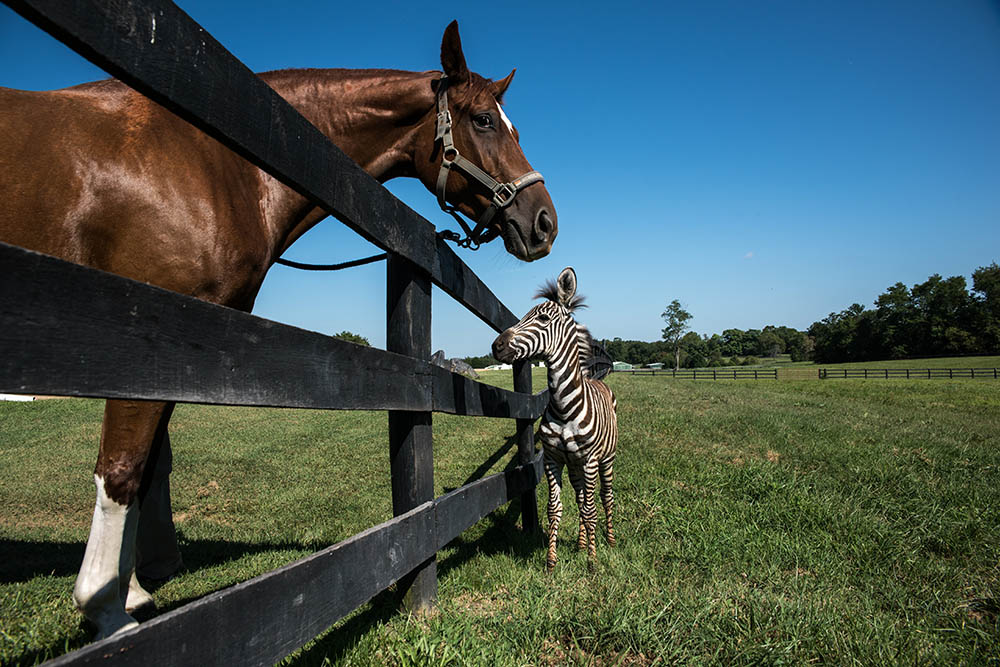You’ve probably heard a saying that horses are just zebras that lost their stripes or that zebras are just horses with extra stripes. However, there are numerous differences between those two animals.
Similarities
Horses, just like zebras, can sleep while standing up. There are naturally some animals that prefer sleeping while laying down, for that they need to feel safe. But generally, at night only foals and younger horses sleep that way, most of the others sleep standing up.
Horses’ and zebras’ menus consist of leaves, branches and grass. They are herbivores. Additionally, both are mammals that have similar teeth, hooves as well as manes and tails.
Temperament
Horses are zebras are wild animals. However, for thousands of years horses were domesticated thanks to their value whereas zebras remained wild. There is no doubt about the fact that horses have their first contact with humans within a few days after their birth. This allows them to have much more friendly relationships with humans than wild animals.
Ancestry
Horses and zebras have similar genetic types, and both belong to the Equidae family. Regardless of their similar looks and genetics, they are two distinct species with many differences.
Species classification
There are three main types of zebras with their own, different subspecies:
- the plains zebra (e.g., Equus quagga, Equus q. borensis, Equus q. chapmani),
- the Grévy’s zebra (Equus grevyi)
- and the mountain zebra (Equus zebra hartmannae, Equus zebra zebra). Each of these species lives in different terrains; the plains zebra can be found in southern and eastern Africa, the Grévy’s zebra lives in Ethiopia and Kenya, whereas the mountain zebra lives in the mountain meadows of Namibia and south-west Africa.



On the other hand, horses were domesticated thousands of years ago and nowadays can be found in every part of the globe. Despite there being over 400 breeds of horses with their unique looks and characteristics, they all belong to the same species (Equus caballus).
Visual differences
There is no doubt that the biggest difference between those two species is stripes. Zebras come only in one coat variation: black and white. However, their stripe pattern is unique to every single zebra. Similarly, to human fingerprints, no zebra is ever the same. Terms of horses, their coats have a wide range of colors and even the animals of the same breed can differ greatly.

In terms of body shape zebras more resemble donkeys – they have a flat back, long and rounded ears, and their mane is not too lush but rather sticks up like a mohawk. Their tales are much shorter than horses’ tales with only individual tufts of hair.
Due to evolution and adaptation to living conditions, it’s zebras that have much stronger hooves. Their hooves are also more rounded and a bit smaller, which allows them to walk more freely over the steppe or mountainous terrain.
Zebras are quite small, and their spine is relatively straight, therefore they can’t be ridden.
Relationship with humans
Horses impact human civilization greatly. Their help with farming, battles and transport significantly influenced the future of humans.
Horses are incredibly intelligent and loyal animals. That’s why they still work with humans even though they were replaced by machinery in most fields.
There are some instances of contact and relationship between humans and zebras, but for the most part, they keep to themselves.
Diet
Horses and zebras are herbivores. Horses’ diet is mostly composed of grass, hay and different types of grains. Thanks to their domestication, horses’ menu was expanded with special feeds, supplements and man-made silage.
Zebra’s diet consists mainly of leaves as well as bushes. Their diet also depends on the region they live in.
Zebra and a horse hybrid
Humans conduct many experiments and one of them is crossing a zebra and a horse. In the case of a cross between a zebra stallion and a horse mare, there is a zorse. In the opposite combination, there is an hebra. As you can notice, even though at first glance horses and zebras seem quite similar, there are many differences between them. After analyzing those characteristics, there is no doubt why horses were domesticated, and zebras remain wild.

